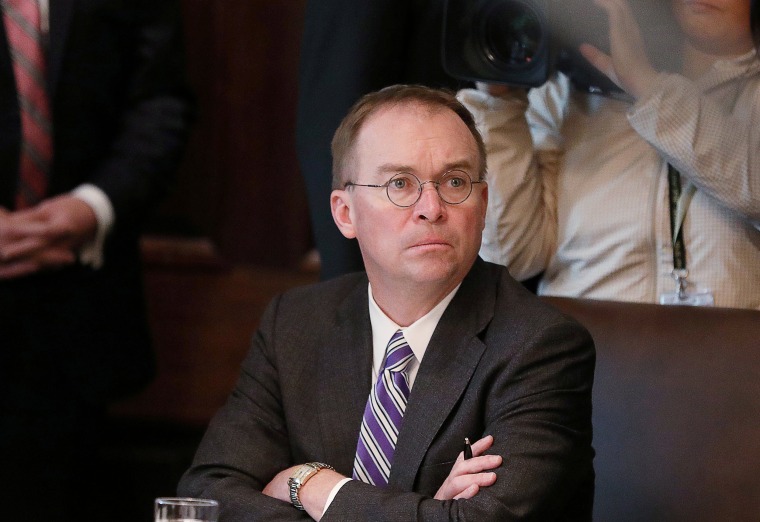WASHINGTON — Acting White House chief of staff Mick Mulvaney first learned about the U.S. military raid against ISIS leader Abu Bakr al-Baghdadi after the operation was already underway, according to five current and former senior administration officials.
Mulvaney was at home in South Carolina when President Donald Trump wrote on Twitter on Saturday night that “Something very big has just happened!” He was briefed on the raid that night, officials said.
The extraordinary move by Trump to leave his chief of staff out of the most significant U.S. military operation against the world’s most wanted terrorist since the killing of Osama bin Laden in 2011 represents a major blow to Mulvaney, suggesting that he is increasingly sidelined inside the White House.
The White House chief of staff typically would be central to such a momentous gambit for a president, coordinating logistics, public statements and notifications of congressional leaders and allies. Bill Daley, who was White House chief of staff during the bin Laden raid, was seated next to then-President Barack Obama as he monitored the raid in a secure White House room with a small group of senior officials.
Andrew Card, former President George W. Bush’s longtime chief of staff, said the exclusion of Mulvaney from a moment of such magnitude in the presidency is difficult to grasp because the chief of staff typically would be in national security meetings leading up to it and tasked with coordinating with other top officials on everything from a communications strategy to a plan in case the raid failed.
Download the NBC News app for breaking news and politics
“I’m baffled by it,” Card said. “It’s hard for me to imagine."
Mulvaney’s job has been in question since he was named “acting" rather than permanent chief of staff in December 2018. And his future in the role has been even more tenuous in the almost two weeks since he gave what Trump and those closest to him felt was a disastrous public defense of the president against the Democrats’ impeachment inquiry.
But the news that the White House chief of staff learned of the al-Baghdadi raid around the same time as the rest of the world is the strongest indication that Mulvaney is perhaps a chief of staff in name only, officials said.
“It’s really unprecedented, and to me it’s just a symptom of a total breakdown in the White House functions,” said Chris Whipple, author of “The Gatekeepers: How the White House Chiefs of Staff Define Every Presidency.”
“Only in a completely dysfunctional White House would the White House chief of staff be out of the loop on something so significant,” he added.
But, Whipple said, it’s not surprising given that Mulvaney made a concerted decision early into his tenure not to challenge the president or operate as a powerful chief of staff.
“He really is an invisible man at this point,” Whipple said of Mulvaney.
A senior administration official said Mulvaney had long planned this past weekend’s visit home to South Carolina and said his lack of knowledge about the al-Baghdadi raid was not a reflection of his status with the president.
“The element of surprise was very important,” the official said. “People’s lives were on the line, so it was a very small group.”
Another White House official said of Mulvaney’s absence that the “operation began very quickly, and while he was not able to get to a secure location in time to participate, he was briefed on its success upon conclusion.” This official, who is close to Mulvaney and spoke on the condition of anonymity, disputed the characterizations of other administration officials and said Mulvaney “was fully aware of and fully briefed on the operation,” but would not say when and did not offer additional details.
One person close to the White House said the president didn’t include Mulvaney because he doesn’t see him as having a role in national security issues. The claim is unusual given that Mulvaney replaced John Kelly, a highly decorated four-star general, who served as chief of staff for 16 months after a stint as secretary of Homeland Security.
The president decided Friday to authorize the al-Baghdadi raid in northwest Syria, officials have said. That same day, he traveled with Mulvaney to an event in Columbia, South Carolina. While the president arrived back in Washington around 5 p.m. Friday, Mulvaney stayed behind in his home state to spend the weekend with his family.
Trump spoke from the White House on Sunday morning, confirming that U.S. Special Operations forces had killed the Islamic State militant group's leader. Mulvaney was still in South Carolina, returning to the White House on Monday.
Trump has been actively considering possible replacements for Mulvaney, officials said. On Monday, White House spokesman Hogan Gidley repeatedly declined to say whether the president has confidence in Mulvaney when pressed by NBC News.
“Mick has done a good job implementing the president’s policies at OMB and as acting chief of staff,” Gidley said, referring to Mulvaney’s role as the director of the Office of Management and Budget.
When pressed again for a “yes or no” answer, Gidley said: “When the president doesn’t have confidence in someone, you’ll know it.”
Mulvaney roiled some Trump allies when, during a White House briefing Oct. 17, he seemed to link the Trump administration’s decision to withhold military aid for Ukraine to investigations into the Democrats and the 2016 election. Mulvaney later was forced to walk back his comments and released a statement saying, in part: “Let me be clear, there was absolutely no quid pro quo between Ukrainian military aid and any investigation into the 2016 election.”
But a person close to the president said Mulvaney was “cooked” after that performance.
“Mick self-immolated,” this person said. “He got up there, poured lighter fluid on himself and lit the match.”




